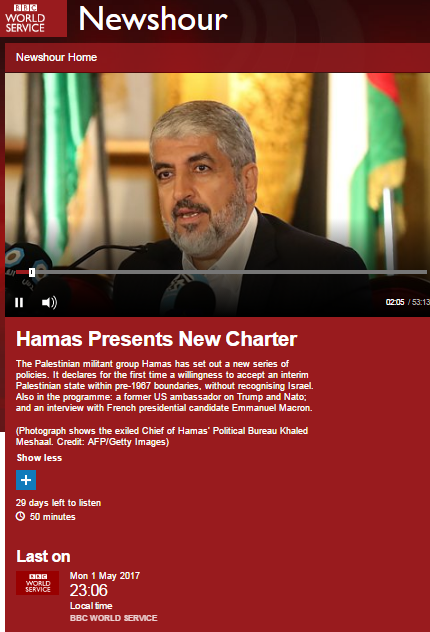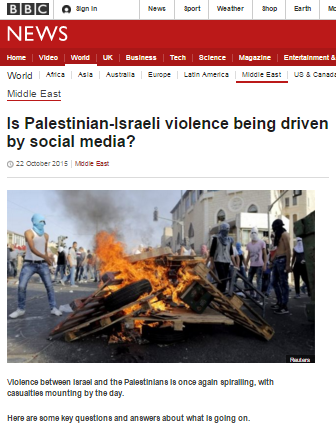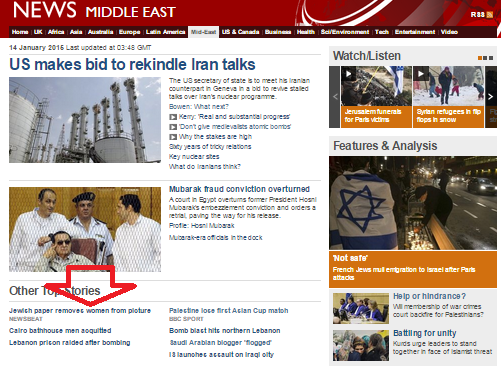As documented in part one of this post, reports that appeared on the BBC News website on May 1st and 2nd clarified to audiences that Hamas itself had said that the new document it launched in Qatar on May 1st does not replace the terror group’s 1988 Charter.
Nevertheless, the BBC World Service radio programme ‘Newshour‘ chose to present the lead story in its May 1st late edition under the inaccurate heading “Hamas Presents New Charter”.
“The Palestinian militant group Hamas has set out a new series of policies. It declares for the first time a willingness to accept an interim Palestinian state within pre-1967 boundaries, without recognising Israel.”
Presenter Tim Franks introduced that long item (from 0:44 here) as follows: [emphasis in italics in the original]
“First to the Middle East. One of the nostrums, one of the pieces of received wisdom about the region is that when it comes to one of the oldest conflicts of the lot – the conflict between the Israelis and the Palestinians – nothing really changes however many people die in the occasional eruptions of war, however much pressure grows inside this congested land, however much effort is expended by presidents of the United States.
Now though comes news – indeed just before we came on air – of the Palestinian Islamist group Hamas making what for them is a major announcement. They were bringing out their first new policy document since their founding charter almost thirty years ago and the question we want to ask is whether this marks a potentially significant shift for them, for the Israelis and for the international response. In a moment we’ll hear from a Hamas spokesman and from a member of the Israeli government. First let’s hear from our correspondent Yolande Knell in Jerusalem. Who are Hamas?”
Audiences did not in fact hear an Israeli view at all in this item.
After listeners heard an anodyne portrayal of Hamas from Knell (which of course at no point included the word ‘terror’), Franks asked her the following question.
“What are the major changes that have come out of this new document of general principles and policies, as they call it?”
Knell replied: [emphasis in bold added]
“Well I’ve spent much of the day looking back at the 1988 founding covenant. Ahm…and now we have in front of us the articles of this new policy document and there are some ways in which there’s definitely a lot more moderate, a lot more measured language; some real departures from that earlier document. And it really drops its long-standing call for an outright destruction of Israel and also its association with the Muslim Brotherhood. This appears to be an effort to improve its relations with other Palestinian factions, with Arab countries and the wider world.”
In other words, having read the following clauses from that document, Knell egregiously chose to portray them to BBC audiences as meaning that Hamas has ‘dropped’ its aspiration to erase Israel from the map.
“Palestine symbolizes the resistance that shall continue until liberation is accomplished, until the return is fulfilled and until a fully sovereign state is established with Jerusalem as its capital. […]
Palestine, which extends from the River Jordan in the east to the Mediterranean in the west and from Ras Al-Naqurah [Rosh HaNikra – Ed.] in the north to Umm Al-Rashrash [Eilat – Ed.] in the south, is an integral territorial unit. It is the land and the home of the Palestinian people. The expulsion and banishment of the Palestinian people from their land and the establishment of the Zionist entity therein do not annul the right of the Palestinian people to their entire land and do not entrench any rights therein for the usurping Zionist entity.
Palestine is an Arab Islamic land. It is a blessed sacred land that has a special place in the heart of every Arab and every Muslim. […]
The following are considered null and void: the Balfour Declaration, the British Mandate Document, the UN Palestine Partition Resolution, and whatever resolutions and measures that derive from them or are similar to them. The establishment of “Israel” is entirely illegal and contravenes the inalienable rights of the Palestinian people and goes against their will and the will of the Ummah; it is also in violation of human rights that are guaranteed by international conventions, foremost among them is the right to self-determination.
There shall be no recognition of the legitimacy of the Zionist entity. Whatever has befallen the land of Palestine in terms of occupation, settlement building, Judaization or changes to its features or falsification of facts is illegitimate. Rights never lapse.
Hamas believes that no part of the land of Palestine shall be compromised or conceded, irrespective of the causes, the circumstances and the pressures and no matter how long the occupation lasts. Hamas rejects any alternative to the full and complete liberation of Palestine, from the river to the sea. “
Knell continued – contradicting her own previous statement and promoting the falsehood of “pre-1967 borders”:
“We still have in this new document Hamas laying claim to all of historic Palestine which of course includes present-day Israel. It doesn’t recognise Israel in any way; it continues to refer to it as the Zionist project or Israel in inverted commas. But it does now agree to a transitional Palestinian state in Gaza, the West Bank and East Jerusalem – what’s known as the pre-1967 borders. This of course is the basis of peace talks with Israel.”
At that point Knell was cut off and Franks went on to introduce a frequent BBC interviewee; Ghazi Hamad of Hamas.
Franks: “How significant a shift does he think this is from the former founding charter which talked about an existential war with Jews?”
Although the interview with Hamad is of very bad quality and barely audible or intelligible, listeners did hear him claim that the new document is “not a shift”, that it represents the evolvement of Hamas’ position over the years and that it shows “what is the real position of Hamas”.
Repeating the same falsehood as Knell before him, Franks then asked Hamad:
“Can I ask you in particular; one of the big shifts at least from this charter seems to be the acceptance in the first instance of a Palestinian state along the 1967 borders. So – the West Bank, Gaza and at least part of Jerusalem – if not the whole of Jerusalem as far as Hamas is concerned. I just wonder what then happens after that stage. Even if the Israelis were prepared to accept that – given that there are 6 million Jews who live in this country called Israel who are proud to call themselves Israelis, want to carry on calling themselves Israelis. What happens to them?”
Hamad of course did not answer that question and listeners got another dose of Hamas propaganda instead before Franks went on to introduce his final interviewee while once again promoting the erroneous notion that the new document replaces the old Hamas Charter.
Franks: “Well does this mark a change in approach and does it demand a new response from the international players, this Hamas charter? […] Has the diplomatic weather around the Palestinians and Israelis changed? Daniel Kurtzer was the US ambassador to Israel between 1997 and 2001 and is now professor in Middle East policy at Princeton University.”
Listeners heard Kurtzer inaccurately describe the document too.
“The current Israeli government is not going to see this new charter as anything of importance….”
They also heard Kurtzer advocate the position that the new document “represents a shift” in Hamas which justifies “starting to talk to them”.
Franks closed the item as follows:
“And just within the last few minutes Fatah – the rival Palestinian faction – has said that the new Hamas document is identical to the position of the PLO in 1988. Hamas demands eh…eh…to apologise to the PLO.”
As the BBC News website reported, the demand for an apology to the PLO did not come from Hamas but from Fatah.
“However, Fatah spokesman, Osama al-Qawasmi, criticised Hamas for not altering its stance earlier.
“Hamas should apologise to the PLO after 30 years accusing it of treachery and blasphemy and for causing a sharp split between the Palestinian people,” he said.”
The following day – May 2nd – Tim Franks was still touting to ‘Newshour’ listeners around the world the inaccurate claim that the document is a ‘new charter’ (at 38:11 here):
“On yesterday’s programme we brought you news of the Palestinian Islamist movement Hamas making a major announcement: a new and apparently less hardline charter.”
As we see, BBC World Service audiences did not hear accurate portrayal of what the new Hamas document is, what it says or what it means. Did BBC Radio 4 listeners fare any better? That question will be answered in part three of this post.
Related Articles:
How will the BBC report Hamas’ upcoming botoxed manifesto?
Revisiting Jeremy Bowen’s facilitation of Hamas PR
BBC coverage of new Hamas document – part one: website




